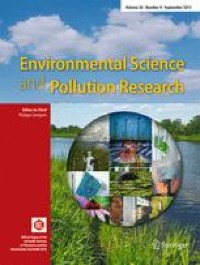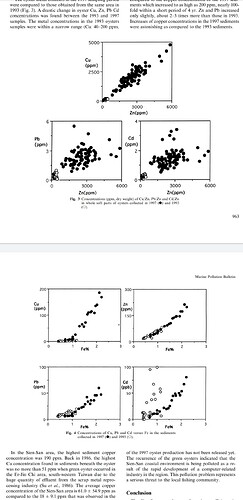Some screenshots from some random papers I have.
GEOSTATTSTICAL ANALYSIS OF SOIL ARSENIC CONTENT IN TAIWAN
Tsun-Kuo Chang, Guey-Shin Shyu, Yu-Pin Lin and Nan-Chang Chang
Moreso note where than the levels
Screenshot_20230613-140747_Drive|243x500
Uptake of Heavy Metals by plants in Taiwan
Heavy Metal Concentrations in the Common Benthic Fishes Caught from the Coastal Waters of Eastern Taiwan
Heavy Metal Content of Rice and Shellfish in Taiwan
Major reported neurotoxicity of heavy metal poisoning in Taiwan (note, the reported ones mainly from work. not long term exposures to food and environment)
Levels of heavy metal cadmium in rice (Oryza sativa L.) produced in Taiwan and probabilistic risk assessment for the Taiwanese population
“Waste and wastewater generated by industry, along with smoke and falling
particles will cause various extents of heavy metal pollution. These metals are arsenic,
cadmium, chromium, mercury, nickel, lead, magnesium and copper. Contaminated
soil would have a number of microorganisms and nitrogen extent lower than normal
soil. Different plants need different heavy metals for survival, however heavy metal
overdose would toxify the plants and cause bioaccumulation inside of the plant.
Consumption through the food chain would be detrimental to human health.
Agricultural pollution mainly happens at contaminated crop plants. It is basically
rice grain containing cadmium and mercury, which is exceeding safety standards. In
2001, near the Lunding land, Chaojhou Township, Pingtung County, there was an
event of high copper content in the soil, indicating heavy metal pollution that is serious
enough to deserve attention from public.”
Occurrences of Green Oyster and Heavy
Metals Contaminant Levels in the Sien-
San Area, Taiwan
“Copper concentrations in the sediments and oyster
reached as much as 200 and 5000 ppm, respectively. The
green oyster phenomenon occurred as a result of these
rapid increases of metal concentrations. In addition, the
accordant rapid increase of copper concentrations in the
sediment and oyster within a short period of only 4 yr
demonstrates that the Sien-San coastal area is under the
drastic stress of copper pollution. This pollution prob-
lem represents a serious threat to the local ®shing
community.”
If you want to test, or just see the bare minimum of what companies are testing:
https://www.sgs.com.tw/en/service/page/16/2/21-food-services/286-2020-06-22-04-19-22
Distribution of heavy metals in the sediments of agricultural fields adjacent to urban areas in Central Taiwan
Abstract:
“In 2002, the Environmental Protection Administration of Taiwan began a detailed survey of heavy metals in soils, to determine the scope of the contaminated lands in the Changhua County’s agricultural fields. It was found that agricultural lands have been seriously polluted with Cr, Hg, Cu, Ni, and Zn, due to industrial wastewaters. This study, characterized the processes associated with heavy metal pollution by analyzing heavy metal contents in sediments within two periods, 2002 and 2010. This study employed geostatistical and multivariate statistics to obtain spatio-temporal variations of heavy metal pollution in paddy fields. The results indicate that, changes in industrial types have been altered the characteristics of pollutions, such as reducing the number of plants in industries (i.e., electroplating, surface treatments, metal works, chemicals, papermaking, etc.). Their wastewaters contained a large number of Ni, making the pollution composition of driven factors have been changed that can be indicated in this study. Pollution distribution and irrigation systems are positively correlated and concentrations of Cr, Cu, Ni, and Zn were inversely proportional to the scale of irrigation channels.”
And so on. The pollution in Taiwan is studied enough to say objectively we are terribly polluted. But the research is still rather lacking. Garaunteed it reaches far worse than what we currently know. But for the pollution denier, it’s already beyond bad enough to care  So no justifications are needed haha.
So no justifications are needed haha.
Enjoy your meal 









